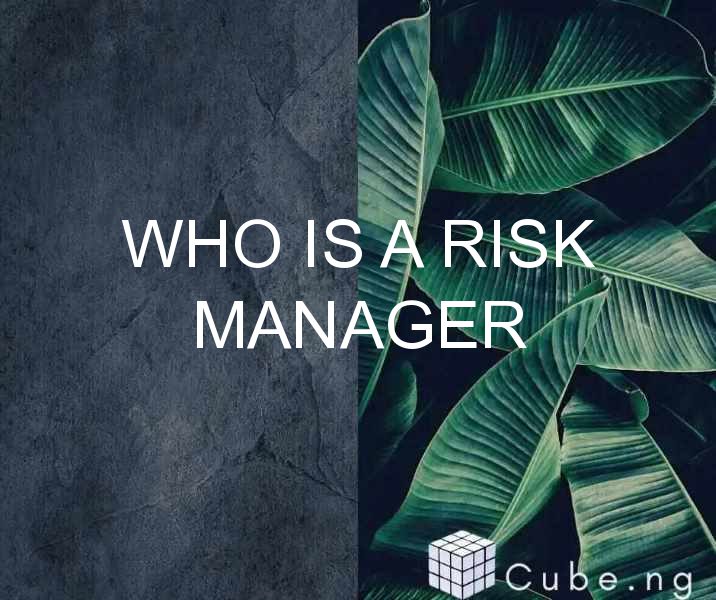Table of Contents
Who Is A Risk Manager?
Risk management is a crucial aspect of any business, organization or even personal life. It involves identifying potential risks or threats, assessing their likelihood of occurring, and taking measures to prevent or mitigate their impact. A risk manager is a professional who plays a vital role in this process. In this article, we will delve into the role of a risk manager, their responsibilities, qualifications, and career prospects.
What Is Risk Management?
Before we dive into the specifics of a risk manager, let's first define what risk management is. Risk management is the process of identifying, assessing, and prioritizing risks or potential threats that could negatively impact an organization's goals or objectives. It involves taking measures to prevent, mitigate, or transfer the risk to a third party.
Risk management is essential in any organization as it helps to minimize losses and maximize opportunities. It enables businesses to make informed decisions and allocate resources effectively.
Who Is A Risk Manager?
A risk manager is a professional responsible for identifying, assessing, and managing risks in an organization. They are responsible for developing and implementing risk management strategies and policies to minimize potential losses and protect the organization's reputation.
Risk managers work in various industries such as finance, insurance, healthcare, manufacturing, and construction, among others. Their role is critical in ensuring the sustainability and growth of organizations, as they are responsible for managing potential risks that could negatively impact the organization's goals.
What Does A Risk Manager Do?
The role of a risk manager varies depending on the organization and industry they work in. However, some of the common responsibilities of a risk manager include:
Risk Identification
A risk manager is responsible for identifying potential risks that could negatively impact the organization's goals. They analyze various factors such as internal and external factors, market trends, and emerging risks that could affect the organization's operations.
Risk assessment and analysis
After identifying potential risks, a risk manager assesses and analyzes the risks to determine their likelihood of occurring and their potential impact on the organization. They use various tools and techniques to evaluate the risks and develop strategies to mitigate or prevent them.
Risk Mitigation
Risk mitigation involves taking measures to minimize the impact of potential risks. A risk manager develops and implements risk management strategies and policies to prevent or mitigate the risks. They work with various departments and stakeholders to ensure the strategies are effective.
Risk Transfer
Risk transfer involves transferring the risk to a third party such as an insurance company. A risk manager assesses the potential risks and determines whether it's feasible to transfer the risk to a third party. They work with insurance companies to ensure the organization is adequately covered.
Compliance
A risk manager ensures the organization complies with various regulations and standards. They keep up-to-date with the regulatory environment and advise the organization on compliance issues.
Reporting
A risk manager is responsible for reporting on various risks and mitigation strategies. They provide regular reports to stakeholders and senior management to keep them informed of potential risks and the effectiveness of mitigation strategies.
Qualifications For A Risk Manager
To become a risk manager, you need to have a degree in a related field such as risk management, finance, economics, or business. You also need to have experience in risk management, preferably in the industry you want to work in.
Some of the critical skills required for a risk manager include:
- Analytical skills
- Communication skills
- Decision-making skills
- Attention to detail
- Problem-solving skills
- Strategic thinking
- Leadership skills
- Time management skills
Career Prospects For A Risk Manager
The demand for risk managers is expected to increase as organizations become more aware of the importance of risk management. According to the Bureau of Labor Statistics, the employment of risk managers is projected to grow by 10 percent from 2019 to 2029, faster than the average for all occupations.
Risk managers can work in various industries such as finance, insurance, healthcare, and government. They can also work in consulting firms or as independent consultants.
The salary for risk managers varies depending on the industry they work in, their level of experience, and the location. According to payscale.com, the average salary for a risk manager in the United States is $87,297 per year.
Final Thoughts
A risk manager plays a vital role in any organization by identifying, assessing, and managing potential risks. They work with various departments and stakeholders to develop and implement risk management strategies and policies. To become a risk manager, you need to have a degree in a related field, experience in risk management, and critical skills such as analytical, communication, and problem-solving skills. The demand for risk managers is expected to increase, and the salary varies depending on the industry, experience, and location.




